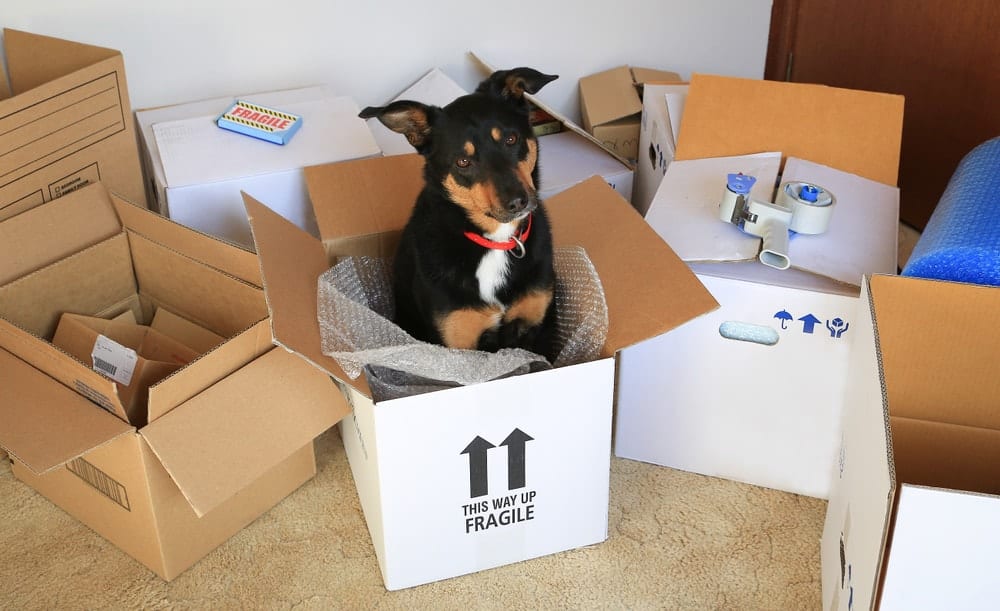“This post contains affiliate links, and I will be compensated if you make a purchase after clicking on my links.”
Moving is one of the chronically dividing things. You either love it or you hate it. The idea of moving either spurs images of new adventure and a chance to reorganize or conjures thoughts of the hours that will be spent packing and cleaning and the difficulties of learning a new place.
Regardless of your actual thoughts on moving, if you are planning an international move, there is a lot more to think about. Do you have all your documentation in line? Are you going to be able to get a home lined up right away? How difficult is the transition into a new culture actually going to be? And how on Earth is your dog going to get settled into their new environment?

For many of us, the last question is ultimately the most important. Moving a pet, in general, can be challenging, but moving them across the world and into another country altogether can be downright difficult. Many of the details can be some work to get figured out and knowing some of the logistics can really help you plan a safe and secure international move for your pet.
Gearing up for a move
There are plenty of reasons that you may choose to move internationally: a new job, a romantic relationship, or even just difficulty qualifying for a loan in today’s rapidly changing market. No matter what the ultimate reason is, you’ve made the choice that you will not leave your pet. Great! Now it’s time to get down to business.
Your dog is a lot more in tune with you than you might initially realize. They know immediately when you start packing boxes and moving things around that something is up. And that can cause a lot of unnecessary stress. Fortunately, there are a lot of things you can do to help prepare your dog for a move. One of the big things to keep in mind is that dogs are creatures of routine; something as simple as taking time away to maintain your regular walks or go outside and throw a ball like you normally would can be a huge reassurance to a pet.
As you gear up to move internationally, you need to start doing your homework early. Like way earlier than you think is reasonable. Some countries have very long waiting periods for pets to enter. For instance, the UK requires that pets be updated on rabies vaccinations and then wait up to a month before flying over. Planning last minute and expecting things to work out for you and your dog is foolish.
Flights and travel
Part of doing your homework early is figuring out flights and travel arrangements for your dog. Many airlines have specific requirements for pets such as the ability to stand, lay down, and make a full circle in their kennel. That can be an incredibly challenging feat for those with large or extra-large dogs and may take a bit of preparing for.
Likewise, different airlines have different regulations for how many animals they can have onboard whether that be in the passenger deck with their owners or in the cargo below. Planning for your pet either by having a pet transfer company help you or having them on the same flight as you requires having your ducks in a row early. Even one small thing out of place can put a major kink in your travel plans and may force your pet to fly alone and arrive a few days after you.
Finally, you will most certainly realize quickly that both you and your dog are a ball of nerves. Flying is stressful for us, but it is nothing compared to how your favorite companion likely feels. There are all sorts of new smells and loud noises to deal with, plus you just left and now they are alone with a bunch of strangers. You may consider something to help them relax, but try to avoid medications as they can have unexpected side effects at high altitudes. Try sticking with one of your T-shirts or a favorite blanket.
International regulations and getting settled
Another piece of research you likely need to do before moving your pet overseas is a bit about regulations for pets entering the country. Most pets are going to be allowed, but certain countries have rules that will make bringing a pet difficult. For instance, ferrets are not allowed in New Zealand, proof of adoption is required before you can leave Russia with a pet, and pets without proper vaccination records are required to quarantine for 30 days before being released to your care in China.

Now, you’re on the ground in your new home country. Assuming you’ve made it this far, it is safe to say that you got over your cold feet about buying a home! The next step is picking up your pup and getting both of you settled into your new location. It may have been challenging, but it is starting to all feel worth it.
Getting everyone home and settled into your new home is the final step of moving your pet. One of the best things you can do to help your pet settle in is to create a space for them with their things. Additionally, spend quality time with your pet and try not to leave them alone for long periods in the first couple of days. Work towards getting back into your normal routine as quickly as possible – even if it means it takes you longer to get unpacked.
Moving abroad with a pet can be extremely challenging, but in the end, it is always worth it to have them with you. Take steps to prepare long before you go by making sure your pet will meet the country’s regulations upon arrival and getting a plan together for their airline travel early. Once you’re in your new home, work to make them feel comfortable again — after all, you are their number one!
Jori Hamilton is a writer from the pacific northwest. You can follow her on twitter @HamiltonJori and see more of her work at writerjorihamilton.contently.com.























